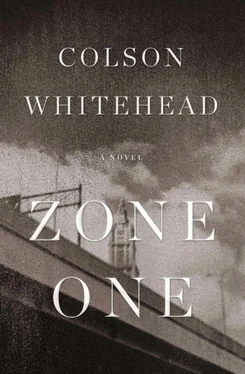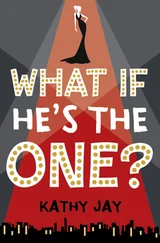She mumbled “Sit-rep, sit-rep” under her breath as she opened the door. Inside the supply closet, cartons and stacks of adhesive notepaper, tax forms, and incomprehensible health-plan packets awaited Business as Usual. No lunging adversary waited inside among the paper plates and Styro cups cached for the miserable office birthday parties and farewell get-togethers. Kaitlyn sat on the edge of a desk. She grimaced at the bodies, distressed by the number and the reminder that she’d let her unit stray from procedure. “Thought it was too quiet,” she said.
The owner of the desk had been drinking a diet cola and reading a best-selling romance/thriller Mark Spitz remembered from bus advertisements. Which one had it been, Mark Spitz speculated: Faceless over there? He corrected himself. There were five desks and four bodies. One of them had made it out. Not everyone perished. Perhaps the owner of the desk was doing chores at that very moment in one of the settlement camps, Happy Acres or Sunny Days, replacing the toilet paper in one of the chemical lavatories, eliminating dented cans of beets from the larders, and sipping whatever regional favorite diet cola the scouting teams had scrounged. The insipid slogan popped up in his head, insistent as malware—“We Make Tomorrow!”—and he flinched as he pictured the camp’s administrative assistant handing out the buttons, which were then obediently pinned to scavenged clothing one size too big or too small. Resist. He had to get all that crap out of his head or else it would turn out bad for him. To bolster this argument he made a glum appraisal of the bodies on the floor.
“We got here just in time.” Gary lit a cigarette. He’d rescued a carton of sponsor cigarettes from a bodega the day before and had acquitted himself nicely so far. They were an economy brand that hadn’t been advertised in thirty years; it sufficed that parents and grandparents had exhaled its smoke into cribs, and the acrid scent of the blend and the cherry-red packaging were imprinted early, reminding its aficionados years later of a happier, less complicated time. “Had him on the ground about to give him a nose job,” Gary added, using the tone he reserved for recounting particularly grisly and epic ways in which he’d seen people expire—he was an almanac of this field of study—and for deriding Mark Spitz’s so-called survival tactics. Despite their friendship, the mechanic was not reluctant in sharing his bafflement that Mark Spitz hadn’t been cut down that first week, when the great hordes of unadaptables had been exterminated or infected, too ill-equipped to deal with the realignment of the universe.
Gary didn’t have much sympathy for the dead, a.k.a. the “squares,” the “suckers,” and the “saps.” When using the word “dead,” most survivors signaled to the listener, through inflection and context, whether they were talking about those who had been killed in the disaster or those who had been turned into vehicles of the plague. Gary made no such distinction; with few exceptions, they were equally detestable. The dead had paid their mortgages on time, and placed the well-promoted breakfast cereals on the table when the offspring leaped out of bed in their fire-resistant jammies. The dead had graduated with admirable GPAs, configured monthly contributions to worthy causes, judiciously apportioned their 401(k)s across diverse sectors according to the wisdom of their dead licensed financial advisers, and superimposed the borders of the good school districts on mental maps of their neighborhoods, which were often included on the long list when magazines ranked cities with the Best Quality of Life. In short, they had been honed and trained so thoroughly by that extinguished world that they were doomed in this new one. Gary was unmoved. From the man’s description of his life before, the portrait Mark Spitz gathered was of a misfit befuddled and banished by the signs and systems of straight life. Then came Last Night, transforming them all. In Gary’s case, latent talents announced themselves. He prided himself on how effortlessly he had grasped and mastered the new rules, as if he had waited for the introduction of hell his whole life. Mark Spitz’s knack for last-minute escapes and improbable getaways was an insult.
“I got distracted,” Mark Spitz said. He didn’t feel the need to defend himself beyond that. He gave himself his usual B. Would he have bested his attackers if Gary hadn’t arrived in time? Of course. He always did.
Mark Spitz believed he had successfully banished thoughts of the future. He wasn’t like the rest of them, the other sweepers, the soldiers up the island, or those haggard clans in the camps and caves, all the far-flung remnants behind their barricades, wherever people struggled and waited for victory or oblivion. The faint residue of humanity stuck to the sides of the world. You never heard Mark Spitz say “When this is all over” or “Once things get back to normal” or other sentiments of that brand, because he refused them. When it was all done, truly and finally done, you could talk about what you were going to do. See if your house still stood, enjoy a few rounds of How Many Neighbors Made It Through. Figure out how much of your life from before still remained and how much you had lost. This is what he had learned: If you weren’t concentrating on how to survive the next five minutes, you wouldn’t survive them. The recent reversals in the campaign had not swayed him to optimism, nor the T-shirts and buttons and the latest hope-delivery system sent down from Buffalo. He scolded himself for succumbing to a reverie, no matter how brief. All that pheenie bullshit had clouded his mind. The tranquillity of 135 Duane Street, however, and a vision of what might be made him slip.
“The man gets distracted,” Gary drawled.
Kaitlyn’s standard op directed her to ignore their razzing and bickering. She came over and inspected Mark Spitz. She got on her knees and gently pushed on the underside of his jaw, which still throbbed. He shook her away. She told him to knock it off. He had been trembling; he stopped as soon as she touched him. Her fingertips brought him back to playground mishaps—tumbling off a swing, launching from a seesaw—where the teacher scampered forth to check the damage and make sure the school wouldn’t get sued. Teachers—why did he think of that? The skel on the floor that resembled Miss Alcott. He took a deep breath and fixed his attention on a dark slab beyond the window: a building that had been swept clean or had yet to be swept, full of shapes moving or not moving in the darkness. That steadfast binary. Kaitlyn looked for broken skin. He waited.
Finally she nodded and reached into her breast pocket for an adhesive bandage. A tiny scratch wasn’t going to give the plague an entry, but conditions in the Zone gave Kaitlyn license to worry about the old run-of-the-mill bugs and infections. The familiar face of the popular cartoon armadillo grinned maniacally on the adhesive strip. “There.”
Gary opened the blinds some more and gray particles twisted through the air. The smoke from the gunfire was perfume hiding the stench of the dead, reassuring Mark Spitz as it hovered in a dreamy layer. These aspects of the mundane, the simple physics of the world, always meant that the latest engagement was over. Safe until the next eruption.
“No indication they were in here?” Kaitlyn asked.
He doubted himself for a second and then told her no. He’d been foolish and let himself daydream, but he hadn’t been that sloppy. You rarely got surprised by a group of them penned in like that—a jumble of file cabinets pushed up against a conference-room door or a busted-up table nailed to the kitchen door had a way of tipping you off. Little things like that. A barricade was a welcome mat these days: you knew what kind of reception you were going to get. There had been no barrier.
Читать дальше












